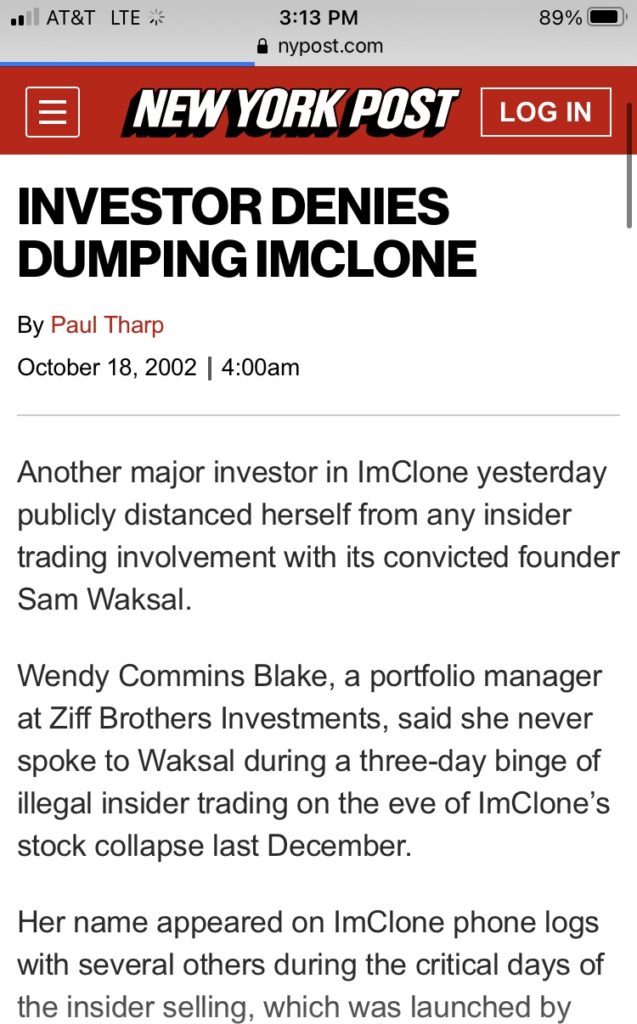You really can’t make this stuff up. Do we need yet another example of how our healthcare system is broken? Just follow the money. Not that I’m buying into this cure-all pill. Alex Berenson writes on his Substack:
Yes, molnupiravir – a pill to treat Covid – seems to reduce hospitalizations and deaths, assuming Merck’s press release from last week holds up.
But it is yet another story of the US health care system and drug development gone awry.
A Miami hedge-fund manager and his wife – Wayne and Wendy Holman – are likely to make hundreds of millions of dollars, possibly billions, on it – and they took almost no risk. They basically got in the way of Merck licensing it from Emory University, where taxpayers had paid for its early development (this is how we make drugs in the United States, friends).
Added bonus: almost 20 years ago, Wendy Holman, who at the time had a different husband and a different last name, saw her name pop up in the same insider trading scandal that ensnared Martha Stewart. It too involved a drug company.
(Wendy Commins Blake aka Holman denied wrongdoing, was never charged, and eventually married Wayne Holman. A few years later the newlyweds found their way to Miami’s Star Island, where they bought a mansion for $28.8 million and the one next to it for $18 million. You read that right.)
The Washington Post had a long piece on the ugly little story of Ridgeback in June 2020. But now that Uncle Joe is president and not the Orange Man, the Post tries not to write anything that might reduce your confidence in Big, Medium, or Small Pharma (and by extension vaccines).
Here’s the lead of the Post piece:
“Ridgeback Biotherapeutics had no laboratories, no manufacturing facility of its own and a minimal track record when it struck a deal in March with Emory University to license an experimental coronavirus pill invented by university researchers with $16 million in grants from U.S. taxpayers.”
By May, Ridgeback had sold the rights to molnupiravir to Merck for “an undisclosed upfront payment, specified milestones and a share of the net proceeds of EIDD-2801 and related molecules, if approved.”
Neither Merck nor Ridgeback has ever disclosed how much Merck paid Ridgeback, nor the royalty rates on the drug. But Merck has said it plans to charge $700 for a course of molnupiravir in the United States and that it expects to produce 10 MILLION courses by year-end 2021, implying $7 billion in sales within months. (Forbes reports the actual cost of the drug is under $20 per course, based on what Indian manufacturers plan to charge.)
Merck has added about $20 billion in market capitalization since it announced the results.
But the real winners are the Holmans. Their royalty rate is based on “net profits,” per Merck’s 10-K – though Merck does not disclose how those will be calculated, or what the rate is. For simplicity’s sake, let’s assume $600 of the $700 Merck is charging will be net profit (this is probably low).
If the Holmans are receiving a 5 percent royalty, they will make $300 million from this year’s courses alone; 10 percent would net them $600 million; and 15 percent $900 million.
How much will they actually make?
Come on, Wayne and Wendy, share with the group!
It’s our money, after all. Or at least it was.
Action Line: When you invest with anyone who isn’t a fiduciary—the federal government for example, where you unwillingly invest with your tax dollars—you’ll find that you invest, and they win. Make sure whoever is helping you invest your money has a fiduciary duty to put your interests first, and will approach your interests as a “Prudent Man.” The government surely won’t do that, and neither will the Holmans of the world. If you want to learn more about fiduciary duty, I would love to talk with you.
Originally posted on Your Survival Guy.


